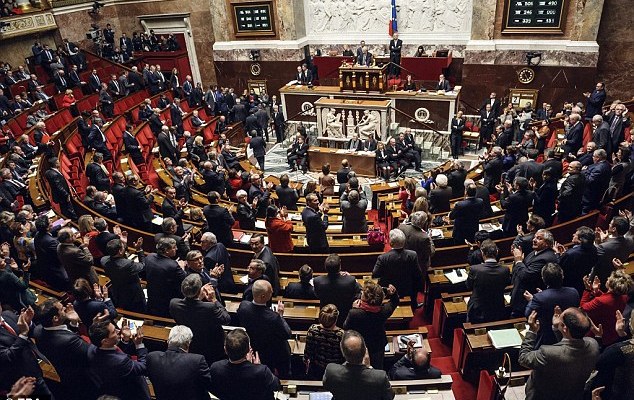An overwhelming majority of the French parliament voted in favor of symbolically recognizing a “Palestinian state”, with 339 votes in favor, and 151 against.
On Tuesday evening, the French National Assembly came out in favor of recognition of “Palestine” as a state. The decision, one of largely symbolic value, is further compounded by the fact that in recent months Spain, Britain, Ireland and Sweden have also made similar proclamations, indicative of the growing international polarization over the conflict.
The move, approved in the lower house National Assembly, is not immediately binding on official French state policy, but urges French lawmakers to “recognize the state of Palestine in view of reaching a definitive settlement to the conflict.” Foreign Minister of France Laurent Fabius initially stated that the country continues to seek diplomatic avenues towards peace between Israel and the Palestinians, including passing a resolution in the UN Security Council that would actively revive peace talks. Ultimately, however, Fabius maintains that if diplomatic efforts fail within two years, “France will have to do its duty and recognize the state of Palestine without delay, and we are ready to do that.”
France’s Vote Hinders Peace, Displays Hypocrisy
Other countries recognizing a Palestinian state have commonly stated that the move is a “vote of confidence” for a future two-state solution, and as a means of recharging stalled peace talks and promoting conflict resolution, but have come under harsh criticism by Israel and her allies.
Emmanuel Nachshon, a spokesperson for Israel’s Foreign Ministry, said the move will “distance the chances of reaching an agreement between Israel and the Palestinians,” and “will only make the Palestinian positions more extreme and send the wrong message to the leaders and peoples of this region.” Israeli Prime Minister Benjamin Netanyahu likewise commented that it was a “grave mistake.”
Immediately following the vote, Meyer Habib, a center-right lawmaker and close friend of Netanyahu, said,
“France today chose the wrong partner and I fear repercussions in relations with Israel, the only democracy in the region…While radical jihad killed citizens of France and other parts of the free world, legitimization is given to the establishment of a state run by corrupt people and terrorists.”
Arab Radicalism and Anti-Semitism Up in France
Home to the largest Arab and Jewish populations in Europe, France has steadily become a site of significant Jewish unrest. Over the last three years, anti-Semitism has more than doubled in France, leaving many concerned that the country’s large, growing Muslim population will continue to prove a hotbed for violence against Jewish communities.
This past summer, mass protests in France against Israel’s defensive operations in Gaza devolved into the destruction and looting of Jewish stores, burning of restaurants in Jewish neighborhoods, and mob rioting outside Paris synagogues. Statistics indicate that anti-Semitism in France has risen by about 50% each year since 2011, while immigration to Israel is up 300%. According to the Jewish Agency for Israel, between 5,000 and 6,000 French Jews — 1% of the community — will have immigrated to Israel by the end of 2014. Despite continued terror attacks, already this year more Jews have immigrated to Israel from France than from any other country in the world, including the United States.
Tell us in the comments: Do YOU think this political trend is actually intended to harm prospects for peace in Israel? What should Israel’s true allies do to better support her on the international stage?
